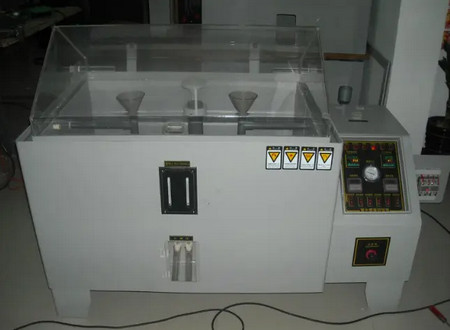- Qinsun Instruments Co., Ltd.
- Tell:+86-21-6780 0179
- Phone:+86-17740808215
- Address:No. 2578 Minhang District Gu Dai Road, Shanghai
- Contact:Mr. Li
- QQ:846490659
Selection of salt spray testing machine types

The demand for salt spray test chambers in industry is increasing, but the environmental testing industry in China is currently uneven. How to choose a high-quality product with excellent performance and reasonable price is a concern for every buyer. Below, we will explain the precautions to be taken when purchasing salt spray test chambers:
1. Selection of salt spray testing machine type:
Salt spray test is an environmental test that mainly uses the artificial simulated salt spray environmental conditions created by salt spray testing equipment to assess the corrosion resistance of products or metal materials. The artificial simulated salt spray test includes neutral salt spray test, acetate spray test, copper salt accelerated acetate spray test, and alternating salt spray test.
1) The neutral salt spray test (NSS test) is an accelerated corrosion testing method that has emerged and is currently widely used in various fields. It uses 5% sodium chloride saline solution, and the pH value of the solution is adjusted to the neutral range (6~7) (as the solution for spray. The test temperature is 35 ℃, and the settling rate of salt spray is required to be between 1~2ml/80cm? H.
2) The acetate spray test (ASS test) was developed based on the neutral salt spray test. It involves adding some glacial acetic acid to a 5% sodium chloride solution, reducing the pH value of the solution to around 3, making the solution acidic. The resulting salt mist also changes from neutral to acidic. Its corrosion rate is about three times faster than the NSS test.
3) Copper salt accelerated acetate spray test (CASS test) is a newly developed rapid salt spray corrosion test abroad. The test temperature is 50 ℃, and a small amount of copper salt - copper chloride is added to the salt solution to strongly induce corrosion. Its corrosion rate is approximately 8 times that of the NSS test.
4) The alternating salt spray test is a comprehensive salt spray test, which is actually a neutral salt spray test plus a constant humidity and heat test. It is mainly used for cavity type whole machine products, which penetrate through the humid environment to prevent salt spray corrosion (but it occurs on the surface of the product and also inside the product). It alternately converts the product under two environmental conditions of salt spray and humid heat, and then assesses whether there is any change in the electrical and mechanical performance of the whole machine product.
2. Material of salt spray machine:
Nowadays, most of the materials used in salt spray test chambers are high-strength and corrosion-resistant PVC plastic sheets. The surface of the PVC sheets is smooth and flat, resistant to aging, corrosion, easy to clean, and leak free. Abandoned materials such as fiberglass and stainless steel. Fiberglass has been phased out for over a decade, and stainless steel and other materials cannot withstand long-term corrosion tests.
3. After determining the specific type and material of the required salt spray test chamber, it is necessary to choose the size of the chamber. When selecting the size of the chamber, it can be based on the size of the customer's test sample. Generally, the total volume of the sample should not exceed 1/3 of the chamber volume, and the area should not exceed 1/2 of the chamber, so that the product can be exposed to the mist generated by the test solution in all parts.





